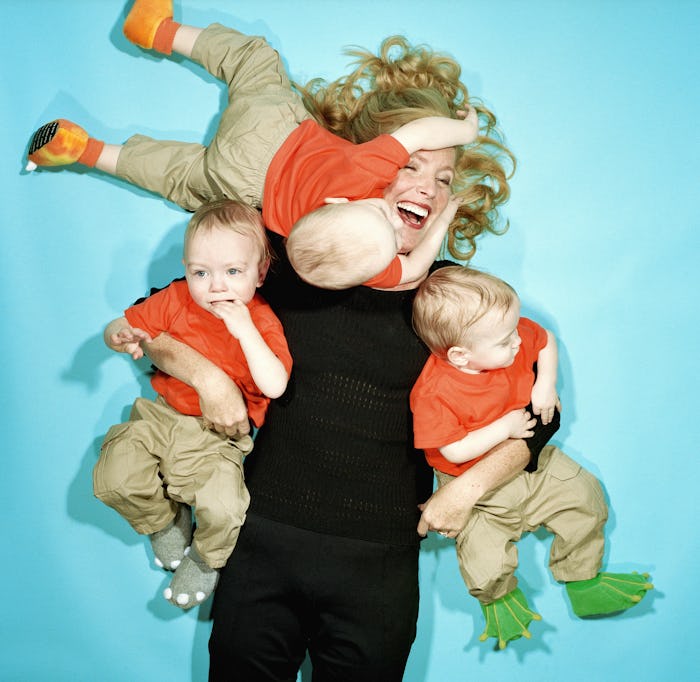Life

I Was Touched Out From The Pandemic, & The Solution Was Sleeping Alone
My husband and I live with our 6- and 9-year-old children in a two-bedroom apartment in New York City, a hallway, elevator ride and lobby away from outside space. We fill the days like most people, engaging in a bit of crisis schooling, trying to get some exercise in, and rearranging ourselves around one another in the space we have. My kids have always been affectionate but now need to be on or near my body at all times and I’m so touched out I could cry.
Being “touched out” is the feeling of being overwhelmed after prolonged periods of physical contact, to the point you develop some form of aversion to the idea of additional touch. While most often associated with nursing parents, it can extend far beyond that, occurring any time other people’s needs for your physical attention outweigh your capacity to give.
Much of the country is similarly quarantined, with parents filling in as the sole providers for their children’s schooling, emotional, and survival needs, and an increase in touch between parent and child is a natural consequence. Emily McMason, a parent coach and educator, explains that parents habitually use touch as a tool to calm kids down, and the pandemic has amplified the stress kids experience. “We’re offering more comfort to kids than before, which can lead us to feel ‘touched out’ by the end of the day.”
Children are “seeking connection through the safety of parents who are their only constant in the world right now,” says Emily King, Ph.D. a clinical psychologist in Raleigh, North Carolina. This is certainly the case with my children. My kids, one of whom struggles with anxiety, have seemingly fathomless emotional needs. I hear the word mommy close to 10,000 times a day, to the point that even the beginning of the M sound makes me cringe. If they’re reading, it’s curled into my side; if they make one line of a crayon across a paper, they run to me for approval as if they’ve just finished painting the ceiling of the Sistine Chapel; if they brush their teeth, I’m required to examine them to see “how shiny they are.” Neither kid can sleep alone; instead they rotate in and out of my bed, burrowing into my body like joeys working their way back into a pouch. Even the cat requires constant attention, finding his way between my laptop and my body, massaging his paws into my flesh. “Please stop kneading me!” I begged him recently, aware of how that sounded out loud.
Finding time alone can be near impossible these days.
In the scheme of things, affectionate children might not seem like something to gripe about, but the incessant pressure to comfort and touch them has at times made me want to run screaming from the apartment.
King explains that when parents can’t take care of ourselves, it’s natural to become overwhelmed. “Noticing and managing our own sensory needs is important to staying mentally well,” she explains. “It’s incredibly hard to stay calm when we’re tired and haven’t had any time alone to recharge.” Yet finding time alone can be near impossible these days.
The other morning my husband and I were talking in the kitchen, clutching our morning cups of coffee and I was expressing how overwhelmed I felt.
“What can I do to help?” he asked.
After thinking about it I answered. “I want a night to myself. I want a night without the kids or the cat or even you.”
“Done,” he said without hesitation. “How about tonight?”
That night, my husband dragged out a twin mattress from the kids’ room into the living room and camped out with both of the kids. The kids came in for goodnight hugs, which I took gladly, knowing I wouldn’t be getting another one for at least 12 hours.
I opened my window wide to catch the cold breeze, burrowing into my comforter with only my own body temperature to regulate. I FaceTimed with a friend not worrying about being overheard, caught up with some of my favorite TV shows as I slowly savored a snack I didn’t have to share, and then finally fell asleep listening to a meditation.
The next morning my kids piled into my bedroom like eager puppies, climbing on top of me to tell me all about their sleepover with Daddy and the pancakes he made them for breakfast. And I was way more ready to welcome them, having replenished myself.
McMason explains that taking time to recharge is an essential part of keeping ourselves healthy and happy. “Adults need happiness too and not just from our role as parents but as people.”
It’s now a weekly ritual for both my husband and I. Tuesday night is his and Thursday night is mine. While the night alone might not be possible for everyone, there’s other little things you can do — 10 minutes of eating breakfast on your own while staring out the window, a daily shower while blasting your favorite music or in complete silence, anything that lets you find yourself again.
It’s far from a panacea — my reserve of patience definitely doesn’t last all week — but knowing I have this time every week better equips me for another day. So when my children pile on top of me like very affectionate WWE wrestlers attempting to break the Guinness World Record for cuddling, I sigh and play along.
Experts:
Emily McMason, M.A., a parent coach and educator
Emily King, Ph.D. a clinical psychologist
This article was originally published on